There is a small group of people trying to unravel the connection between the number and the title of each week’s Modest Expectations. Last week was almost impossible, as I strive not to repeat myself. Some have been obvious which, for me, maintains the diversity, although the search for titles which do not repeat the same theme presents an ongoing challenge. For instance, there have been 266 Popes, but I have tapped this source only once.

On several occasions, I have counted wrongly, which explains why I was not a good “numbers” man. I am pleased with this week’s puzzle. Not that it is very hard but demands a modicum of powers of observation.
Albored the Unready. Part 111
People want a prime minister to just do their job.
That’s my commitment. To do that job properly. To each and every day do my best. And make sure we have a government that actually plans properly and looks after the interests of the Australian people. Anthony Albanese this week
As I predicted, the Murdoch press has started the attempted demolition of Albanese. However, in a week in politics with the ineptness of the current Government firmly on show and growing, manifested in disastrous polling in NSW in four State by-elections, maybe it does not matter if there is a demonstrable unreadiness. Even so, I just hope Albanese does not try to play “Blue Moon” on a triangle.

If Labor wins the forthcoming election, addressing the absence of a Commission to root out corruption at the Federal level – which seems as bad as the worst of any of the States at any time – will be a massive job for Albanese. The establishment of this Commission should already be in draft legislative form ready to be placed before Parliament immediately on a change of Government.
Unless it swiftly isolates the major players in the corruption, the Commission will be entangled in legal brambles and then eventually lost from sight as these “bramble bushes” cover it.
Openly responsible to the Parliament, the manner of selection of the Commission members must be an open process also.
The problem is that Albanese has grown up in a factional NSW environment where the hotel industry lobby in all its forms is a highly-protected species. Therefore, Albanese, who is one of the longest serving members of the Commonwealth parliament, must reflect on his manner of conducting his business to maximise objectivity in government – a far from easy task.
In his progress towards a clean government, he should examine the amount of money consulting firms shovel into their pockets through “sweet deals” with government. I know exactly what goes on. Much of the work, which should be undertaken by bureaucrats with assigned responsibility and expertise, is done by recent MBAs full of theory but devoid of knowledge, which they then pick up at no cost to themselves as they flounder on in a consultancy, which does not need these “content free” consultants. “Reading my own watch” is the term used to describe this flagrant practice.
This is the great disaster of public administration and goes hand in hand with the corruption of parliament. I have been employed as consultant many times where the recommendations have had an impact; but in others where the recommendations have been ignored and ended as a “dust shelf file”.
Albanese needs a strong independent bureaucracy so that when the consultant firm Piranhas come calling, they have to earn the meat hanging from the bureaucratic fishing lines. The problem is that while the TV series “Yes Minister” was very funny, (Margaret Thatcher is reputed to have loved it), its long term effect has been to corrode the politicians’ trust in public administration as witnessed by the growth in ministerial staff and reliance on mates in the consulting firms, some of whom were colleagues before politics and before the politicians take their lucrative pensions and flee Parliament to become outside “consigliere” – sorry “consultants”.
Big challenge to rein in this practice – and not one for the election trail. However, it will be symptomatic of an inability to govern if Albanese fails to follow the Machiavellian dictum and does not tackle it hard and early.
Now for Part IV – if you are still awake. Climate Change and Albored under the Bed.
Cisgender
I have observed the machinations about the Religious Discrimination Bill with an air of disbelief. I doubt whether I am the only one, given how many far more important challenges are facing Australia.
For most of my life I have watched as technical surgical skills have improved such that personal identification can be aided by physical operative change to the appropriate gender
I remember one of my medical tutors put us males in our place by saying that every human is destined to be female until a few vectors appear which direct embryonic to foetal to post-natal existence towards being male.
After all, there are a number of chromosome and sex hormone disorders, which are often rare or beyond the then scope of knowledge, and which may be reflected in extraordinary prowess, particularly of women in sporting competition.
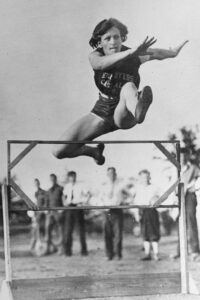
One of the most remarkable athletes of all time was the American, Mildred “Babe” Didrikson. She was able to beat top athletes, both male and female, at sports ranging from bowling to diving. She earned Olympic gold medals in the hurdles and javelin in the 1932 Olympic Games, all-American status in basketball, dozens of golf championships, and is on ESPN’s list of top ten North American athletes of the century.
She lived at a time when there was not the will or the science to determine whether she was a woman or had a chromosomal abnormality where she might look like woman but was in fact a male. She was not the only one to raise questions. There were two Olympic gold medal winning female sprinters in the 1930s who also looked masculine and one, Stella Walsh, an American who when shot dead many years later, was revealed by autopsy to indeed be male.
When the Russians came back on the Olympic Trail, they brought forth a number of oddities, even before the systematic doping with androgens began.
There have been “female” athletes discovered to have Kleinfelter’s syndrome. The first to be publicly accused was Ewa Klobukowska, a Polish sprinter who received a gold medal in the 1964 Olympic Games. People with this syndrome have an extra “X” chromosome but have the “Y” chromosome as well – which defines them as male.
Thus, when a South African female athlete Caster Semanya looks a bit masculine and then is shown to have a hormonal abnormality, discrimination is attested loudly when she was either excluded from competition or forced to take androgen suppression. There was no suggestion of religious discrimination in any of the discussion here.
Yet here is a nationwide imbroglio which grew from Israel Folau’s intemperate behaviour, which became a kernel for every bigot in the community to swarm around his profile as an extraordinary sportsman, and then try to parlay this prowess into some sort of seer of faith.
In my early blogs, I wrote about Israel Folau but I underestimated how his bigotry has gradually graduated to this religious discrimination bill, which a Pentecostal Prime Minister has tried to foist on a nation which, on matters religious, kept on the “cis” side of not mixing belief with the political wedge.
The problem with Morrison and his mates is that they have tried to impose their “transwedge” as it flew across the Alps of Intolerance.
It almost ended up a discriminatory Transgender Discrimination Bill, and fortunately there have been enough politicians prepared to scuttle this ridiculous pandering to fringe groups, with social hang ups on show amidst the happy clapping and forced jollity.
Hence, if people insist on a stigma of transgender on a number of seriously conflicted young people, then since I do not identify myself as one of these, I shall stigmatise myself thus – as cisgender. In the end, you must have a gender, whichever way you describe yourself. However, it is your own private decision not to be paraded in a travesty – called parliamentary debate.
Questions of toilet and bathing facilities are a matter of societal convention, not a matter for government legislation. When my university college became co-educational, the college’s change of facilities was hardly a major topic of conversation in the pubs of Carlton.
Given that “cis” is the antonym of “trans”, it took the serious students in this area until 1994 to coin the term. But there is more.
What about the Infrasexual? This refers to someone “who is not parsex, meaning someone who is strictly dyadic and protosex. They are not intersex nor altersex.” Succinct, if nothing else.
What a dilemma. Do we ban the infrasexual but allow the altersexual?
Meanwhile the World in burning.
Wasabi
 The wasabi that comes in tubes and packets and is familiar to many diners is actually a blend of wasabi and horseradish dyed green — or contains no wasabi at all. In Japan, chefs at higher-end sushi, soba or grilled beef restaurants grate fresh wasabi at the counter, so customers can experience the acute assault on their nostrils and the unique flavour that lingers for just a moment on the tongue.
The wasabi that comes in tubes and packets and is familiar to many diners is actually a blend of wasabi and horseradish dyed green — or contains no wasabi at all. In Japan, chefs at higher-end sushi, soba or grilled beef restaurants grate fresh wasabi at the counter, so customers can experience the acute assault on their nostrils and the unique flavour that lingers for just a moment on the tongue.
For hundreds of years, wasabi grew wild in mountains across Japan, blooming near forests and huddling alongside streams. About four centuries ago, growers in Shizuoka started to cultivate wasabi as a crop.
Wasabi plants sprout in spring water that flows down from the mountains, helping to foster gradations of pungency and hints of sweetness. The most well-known Shizuoka variety, called mazuma, tends to sell for 50 per cent more than wasabi from other parts of Japan.
Over time, local growers say, the spring water has deteriorated in quality, compromised by an abundance of cedar and cypress trees.
Recently, in a substantial article, the New York Times highlighted the parlous condition of the wasabi grower.
From childhood, I remember that horseradish was an accompaniment to the Sunday roast beef at my grandmother’s place, complete with roast vegetables and the obligatory Yorkshire pudding.
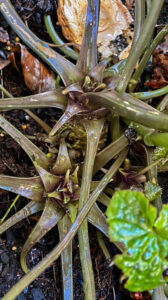 Now, as that wizard green fingered jardineira, Vicki Sheedy, says dismissively, horseradish is a weed. You have to grow it in a pot and not let it get control of the vegetable patch.
Now, as that wizard green fingered jardineira, Vicki Sheedy, says dismissively, horseradish is a weed. You have to grow it in a pot and not let it get control of the vegetable patch.
However wasabi, its Japanese cousin is, as Vicki says, very picky. One Tasmania grower put it this way: “Wasabi is like a 15-year-old. When conditions are perfect and everything is how they like it, they thrive, if something starts to go wrong though they will just sit there and sulk.”
In fact, commercial growing can ideally occur in Australia only in Tasmania, where there is plenty of water and the climate is temperate-on the cool side. The plant is harvested between one to two years. As Vicki further points out, this little plant is a cousin to horseradish and mustard, hence why its heat hits you in the nose rather than setting your mouth on fire like chillies do. It’s also known as Japanese horseradish and she has assured the conditions for its growth.
Currently Vicki’s plants are about 15 months old and she says that on a beautiful property overlooking the D’Entrecasteaux Channel in Southern Tasmania she will soon be able to harvest it. Already she has been using the stems and leaves, but they are much “tamer” in regard to heat compared to the root. At present she grows it in small quantities in a raised garden in the shade near the kitchen so she remembers to water it. Keeping a watchful eye on it, she knows the plant doesn’t like humidity, direct sun or in relation to water – the Goldilocks effect – not too much or too little.
With the production being increasingly compromised by the urban spread, the contamination of water and the decline of the cedar forest and its resultant shade, production in Japan is under stress as the NYT article says
The price of wasabi is rising. It is not a quick return, but as they say, big things from kitchen door plots grow.
The heat is on, Vicki.
Iris Hoffman as she was then, remembers
Janine Sargeant, guest facilitator
We are encouraging my mother to write down her memories of her youth, as she approaches her 96th birthday. She and Queen Elizabeth were born close together in that year – 1926.
Sixteen years old at the time, Iris Hoffman reminds the reader of a time when the Japanese were coming. It was 1942.

The war was getting worse and town councils were ordered to send some employees to go to Tocumwal to help build an aerodrome there as American air troops needed it. Dad was sent! At home in Culcairn and other towns we were trying to get accustomed to being swooped over by American Kittyhawks. They would come in low and scare the hell out of us; they buzzed every town and homestead in the area we were told. At last the airfield was finished, Dad came home and resumed his job with the Culcairn council.
Then Dad decided to move to Gippsland. We would be primary producers on a dairy farm near Maffra with 80-90 cows to milk, twice a day. We did it. Our war effort. My eldest brother, Percy was already in the army, and the youngest, Trevor, was in the airforce, so there we were, Dad and my brother and sister, Keith and Lorna and myself, in the land army – and Mum at home to look after us all.
“McIntyre Field” was established by the USAAF on the NSW/Victoria border, near the Newell Highway. It originally covered an area of about 25 miles square. Named after Captain Patrick W McIntyre who was killed in a crash of a US bomber on 5 June 1943, the field was home to 54 Liberators, 11 Vultee Vengeance, five Kittyhawks and an Airspeed Oxford. Four thousand five hundred RAAF men and 400 WAAF women were based at Tocumwal. It was also a storage and repair depot for aircraft including Boeing, Lancaster, Mosquito and Spitfire. After the RAAF left Tocumwal in 1960, over 700 aircraft were scrapped.
It should be recognised that having a German-sounding name when, in two World Wars, the enemy was Germany, had a negative effect in the community at large, spurred on by the jingoists.
The Lutheran diaspora had settled in the rural areas around Albury. These were people who fled Silesia, from the Prussian Calvinists who persecuted their Lutheran community. Many came to Australia and are concentrated in certain parts of Australia, including areas around Albury. The township of Holbrook, north of Albury, once was called Germantown. The name of the township was changed in that flurry of jingoism which accompanied Australian participation in both World Wars, but particularly in the early stages of the First World War.
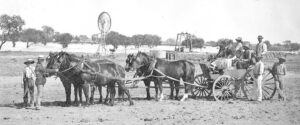 In the 1840s my mother’s family came to Australia from Katowice, which is a major Polish town today but was then Prussia. They settled first in the Barossa Valley but with a shortage of land available there, they walked with their wagons, from South Australia to settle in southern NSW. My maternal mother was a Schröeter. My mother would have been a wonderful subject for “Who do you think you are?”
In the 1840s my mother’s family came to Australia from Katowice, which is a major Polish town today but was then Prussia. They settled first in the Barossa Valley but with a shortage of land available there, they walked with their wagons, from South Australia to settle in southern NSW. My maternal mother was a Schröeter. My mother would have been a wonderful subject for “Who do you think you are?”
Now she still has a store of memories of being part of Australia, including beating Margaret Court once at tennis. No matter that Margaret Court was a teenage prodigy. But still, a win is a win.
But is A Win a Win?
The Russians are completely and utterly over the fence. There they are, continuing their gold medal dominance in sports cheating. The Washington Post teed off this week and below is part of that article from its ferocious correspondent, Barry Svrluga.
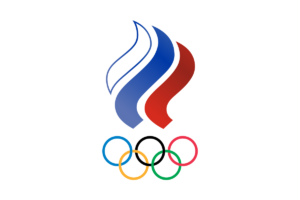 As of Monday afternoon here, the Russian Olympic Committee team had won 18 medals, the second-highest total behind Norway. But maybe there should be a new category for its medals? “Provisionally won?”, “Won … for now?” “Won, pending further info?”
As of Monday afternoon here, the Russian Olympic Committee team had won 18 medals, the second-highest total behind Norway. But maybe there should be a new category for its medals? “Provisionally won?”, “Won … for now?” “Won, pending further info?”
Even in the exceedingly unlikely event that these Games aren’t tainted, it was impossible to watch Russian cross-country skier Sergey Ustiugov grab an Olympic flag as he skated the final meters of the men’s 4×10-kilometer relay on Sunday, winning by a huge margin, watch him celebrate with his teammates, without wondering, “Who’s finishing second — and how long before they’re awarded gold?”
That’s not damning of Ustiugov and his teammates specifically. It’s how the IOC and its cronies have forced us to think. When the iron was at its most scorching, the IOC failed to execute the kind of forceful ban that might have effected actual change in the Russian system. Instead, it demanded what amounts to a change of laundry for Russian athletes (their uniforms cannot bear their nation’s flag here) and swapped out the CD for their celebrations (no Russian national anthem, either). But the show goes on, so the mind wonders whether any of it is legitimate.
That has been true for more than a decade now, and the shame of all this is that when the flame is extinguished here Sunday night, the results from so many competitions still should be sketched lightly in pencil.
Athletes who depart China with suspicions about the fairness of their competitions can’t be offered much encouragement, either. American high jumper Eric Kynard, for instance, won silver at the London Olympics in 2012. He was 21 and beaten only by Russian Ivan Uhkov. CAS later determined that Uhkov and 11 other Russian track and field athletes had been doping. The IOC rejected Uhkov’s final appeal — in November 2021. By then, Kynard was 31. Maybe he stepped onto a chair in his backyard and played “The Star-Spangled Banner” to celebrate.
Spread the blame for such a mess around, but good luck sorting out precisely how to divvy it up. There’s so much inbreeding among governing bodies here that it’s difficult to differentiate one organization from the other. CAS claims on its website that it is “an institution independent of any sports organization.”
The President of its board is John Coates, an Australian lawyer who has been an IOC member for more than 20 years, a period of time in which he has been on the IOC’s executive board and served as a vice president. That’s independent? The World Anti-Doping Agency was founded by Canadian lawyer Dick Pound, a former Olympic swimmer who was first elected to the IOC in 1978. WADA’s 14-member executive committee includes four current IOC members.
How to tell any of them apart? As American skeleton racer Katie Uhlaender told my colleague Adam Kilgore last week, “How do we really know what’s going on behind the scenes?”
Uhlaender has the right to ask. In 2014, she finished fourth in her event, all of four-hundredths of a second behind Elena Nikitina of — you guessed it — Russia. When Russia’s Sochi scheme was exposed, Nikitina was among more than two dozen Russian athletes banned from the Olympics for life — and Uhlaender appeared to have her medal. On the eve of the 2018 PyeongChang Games, Nikitina was reinstated.
That there has been no significant punishment to the entire Russian delegation in the eight years since both boggles the mind and tugs at the heart.
Uhlaender is clear-eyed about it. “It’s not independent,” she said. “None of this is independent. It’s all run by the IOC. It’s really hard to have faith in a system that failed so hard in 2014.”
Particularly because it’s continuing to fail. According to long time Olympic historian Bill Mallon, the Russians have been stripped of 31 medals in the five Games dating from 2012. That doesn’t count winning Russian teams on which more than one athlete was disqualified, nor does it account for disqualified Russian athletes who didn’t medal. The evidence suggests there will be more here. This isn’t a witch hunt. The witch has been identified.
(Those who can be bothered can watch the 15 year Russian figure skater Kamila Valieva compete despite having been clearly doped, the court has ruled.)
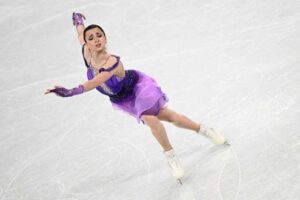
Whether it will eventually have consequences for Valieva is impossible to say. What’s certain: The women’s short program will be held Tuesday, and she will skate in it.
In explaining the reasons CAS will allow Valieva to compete here going forward, Matthieu Reeb, the panel’s director general, cited, among other things, “serious issues of untimely notification of the results” from a test that was reportedly taken on Christmas Day — but that wasn’t reported as positive until after Valieva had competed in the team event here.
Whose fault is that? Well, the Russian Anti-Doping Agency said in a statement: The reason for the delays in the analysis and reporting by the laboratory was another wave of covid-19.” [When in doubt, blame the pandemic.]
What a mess. It’s a mess that, at the moment, falls at the feet of a 15-year-old athlete who is demonstrably the best in the world at her craft. If there’s ever a medal ceremony in the women’s figure skating event, her presence on the podium will be questioned. That’s not her fault. It’s the IOC’s, for creating and sustaining a system in which every Russian medal must be met with suspicion — looking both back, now and into the future.
Mouse Whisper
I could not have said it better, referring to a tweet on the Super Bowl result last Sunday:
Imagine if the Bengals didn’t accept the final score, stormed the field, sued the NFL, and protested the 2022 NFL season calling it fraudulent.

